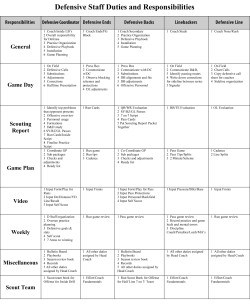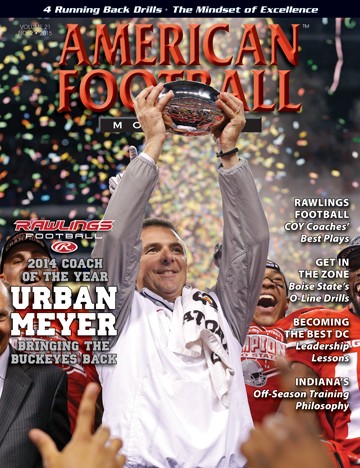DC Leadership Lessons - Detail is critical in making sure a staff knows the expectations of a defensive coordinator.
by: Joe WoodleyDefensive Coordinator, Grand View University©
More from this issue
As a defensive coordinator, you are the head coach of the defense. That’s the way I approach it every day. Before fall camp and spring ball, I discuss my expectations for each coach and their position group. As the leader of those coaches, I want to make sure we are on the same page.
My Expectations -
A. No egos. We should all be trying to achieve the same thing.
We should all be in this for the kids. If you are in it for any other reason such as money, notoriety, or yourself, you won’t be around long. This game has been and always will be about the players and, of course, the team. The coordinator needs to have the least amount of ego of all of them. You need to value the input the coaches offer you. Don’t be a dictator.
B. Loyalty and respect. Give it to them if you want them in return.
These are arguably the most important principles in the coaching profession. Take the high road and give your coaches all the loyalty and respect you would want and they will do anything for you.
C. Be self-motivated. There is always something to do.
I am the type of coach that lets my assistants coach. As the leader of the defense, you need to have things in place so an assistant should never ask, “What do you want us to do now?”
Here is a diagram that outlines their responsibilities throughout the calendar year
(Click to Enlarge Diagram).

D. Coach the players you have, not the ones you don’t.
One of the most annoying things I hear in coaching circles is “we need better players”. To me, that is just admitting you aren’t holding up your end. It is on you as an assistant to develop your guys, and recruit ones that you think are better. They are a reflection of you at the end of the day.
E. Keep your coaching as simple and concise as you can
(coach technique and fundamentals).
Sometimes, we are guilty of trying to find the next best scheme or drill. Winning games is still about being smart and being technically and fundamentally sound in all facets of the game. I put a huge premium on this with my coaches. For their individual drills, they are required to have drills for stance, footwork, tackling, and block destruction. We don’t use a lot of props within our drills. I am a big believer in body-on-body contact because that is a better simulation of game day. If we are good in all of these areas, we can always fall back on them if a certain scheme isn’t working. We will always be gap sound and coverage sound.
F. Handle adversity. Don’t panic. Don’t complain.
In coaching, things don’t always go as planned. We can’t show negative emotions to our players or else they will start to think negatively. Never be too high or too low. Kids are sometimes smarter than we give them credit for. They will see right through you if you are being phony. If there is a sudden change on game day or a schedule change in the practice plan, just coach on the run, and don’t have self-pity or complain. Move on. Kids will appreciate that a lot more than a whiny coach.
G. Coach your guys/not another coaches. Coach your position,
not someone else’s.
If you are the defensive line coach, coach the defensive line. Don’t worry about what the linebackers or defensive backs are doing. You need to take ownership of your position group. You are the leader of that group.
If you don’t hold those staff accountable to your expectations, then they will have no direction. Most coaches will respond and the ones who don’t usually phase themselves out.
The next thing I discuss with them is what they need to focus on within their position groups. Here is an example from the fall of 2014:
Areas of Emphasis
Nose/Rush
• Better stances/first step
• Create depth
• Get players in shape
• Accelerate playbook work
Ends
• Better stances, better first step
• Create depth
• Preach technique and fundamentals
• Counter moves on pass rush
Linebackers
• Understand formations
• Recognize personnel groupings
• Improve pass coverage
Corners
• Communication
• Understand formations
• WR splits
• Improve technique of press man/disciplined eyes
• Need to find two additional players
Safeties
• Communication
• Understand formations/personnel
• Understand down and distance
• Disciplined eyes
Studs
• Communication
• More physical
• Cleaner flat drops
The next items I will outline are what I emphasize in practices and games during the season:
Practice
• Pre-Practice (formation recognition)when needed.
• Team defense drills - pursuit drill, tackling station, intercept.
• Takeaway
• Individuals - Fundamentals, technique ,movement, tackling, blocks, group.
• Team - Keep groups together as much as possible.
• Constantly coach effort, pursuit, takeaways.
• Coach every play!
• One play at a time.
Evaluation
• Grade team settings. Have them done by the next morning.
• Create competition within depth chart.
• 85% grade out and 20 points (T-Shirt).
Performance Goals
• 17 Points or less per game.
• +1 per game in turnover ratio.
• 70% on third down.
• 40% success rate in red zone.
• +1 per Game in “Bombs”.
Outcome Goals
• 4-Peat conference champs.
• Playoff berth.
• Play after Thanksgiving.
These are all of the items I cover with my staff before we hit the field. I know every coach out there has his own way of doing things and I am sure some of my ideas are similar to what you are already doing.
About the Author: Joe Woodley is the defensive coordinator for Grand View University, coaching with his father, Head Coach Mike Woodley. The Grand View program began in 2008, and in 2013, the Vikings won the NAIA National Championship. Woodley also serves as linebackers coach and was previously on the staff of St. Ambrose University. He played at Iowa State from 1999-2003.






